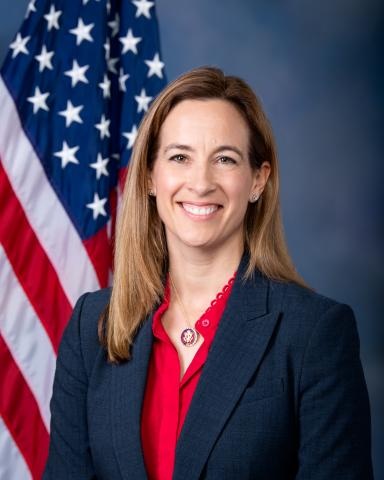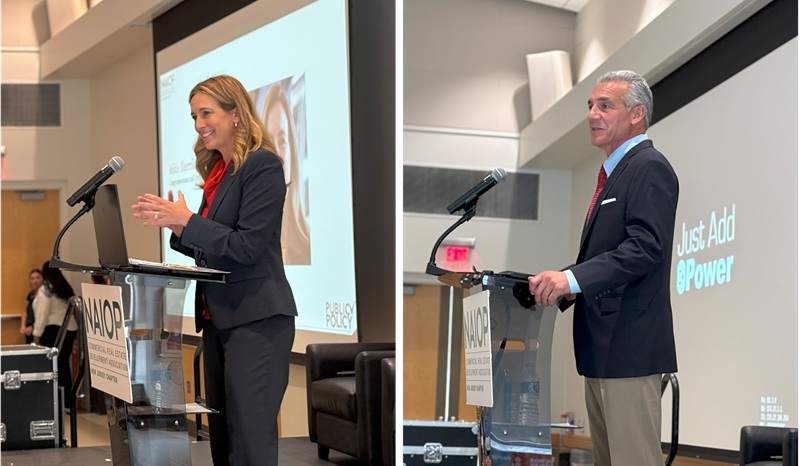U.S. Rep. Mikie Sherrill (left) and former state Assemblyman Jack Ciattarelli spoke to NAIOP New Jersey members on Monday as they campaign to become New Jersey’s next governor.
By Joshua Burd
Speaking to a room of New Jersey commercial real estate leaders, the state’s two gubernatorial candidates seemed to be in line on the issues that mattered most to the sold-out crowd.
Exactly how they’d address those issues is where Mikie Sherrill and Jack Ciattarelli differ — or at least how they hope to distinguish themselves from each other. That was evident Monday during a program hosted by NAIOP New Jersey, where the candidates presented on key topics such as permitting, energy and taxes, among many other policy areas that figured to resonate with property owners and their professionals.
Below are some of the highlights of the highly anticipated event, which drew roughly 200 attendees to Middlesex College in Edison, with Election Day now just six weeks away as the candidates vie to succeed Gov. Phil Murphy.
Red tape and regulations
Sherrill, the U.S. representative for New Jersey’s 11th congressional district, called for fixing the “own goals” that keep the state from having a more business-friendly climate. That includes leading a “huge culture shift” in the regulatory agencies that have created a “get to no” environment in Trenton and that make it notoriously difficult for developers and entrepreneurs to secure permits, she said, starting with her cabinet appointments as governor.
The Democratic nominee said she’d also create a fast-track team to address undue permitting delays, while she would “chart out how we’re moving forward” with respect to developing brownfields, investing in New Jersey’s logistics sector, protecting open space and addressing flooding issues.

“I don’t just hear it from small businesses,” said Sherrill, who is in her fourth term in the House. “I hear it from large businesses. I’ve heard it from many of you, as you are contemplating investing in developments, on how long it takes to build here and how much easier it might be to build in places like Pennsylvania. I’ve heard it because we have so many opportunities here in the state to move forward and that, when we talk about how you’re going to do that, there’s no clear plan.”
Ciattarelli, who spoke separately, said a pro-business administration means a bureaucracy “that will no longer be a police state of collection agencies, but partners — and you’ll get pro-business policies. We desperately need that here in New Jersey.” He cited the fact that the state does not have a Department of Commerce (it was abolished in 1998), suggesting it would be a central piece of growing the economy.
Such an agency would need only one or two dozen people, the Republican nominee said, noting that he would partition the department by North, Central and South Jersey and the Jersey Shore to serve regions that have distinct economies, attributes and challenges and to help the state’s economy “fire on all cylinders.”
The new Department of Commerce would also be divided along the lines of small and large businesses, he added.
“Each one has different needs,” said Ciattarelli, a former state Assemblyman from Somerset County. “And any large project that needs to touch two or three agencies, while they’re going through their early stages of permitting, planning and the like, they’ll get a point person in that department that will shepherd and navigate your permitting process through state government so that you’re not having to work with three or four different agencies simultaneously.”
Energy
Ciattarelli also vowed to create a Department of Energy — another cabinet-level agency that the state hasn’t had in decades — to “put forth a rational energy master plan that meets the needs of our business community” and allow New Jersey to once again be a net exporter of energy. That includes repurposing shuttered power plants in the state and breaking ground on a new nuclear reactor in South Jersey, along with expanding the installation of rooftop solar panels on the state’s many warehouses.
The approach would go hand in hand with reducing regulations but “without screwing the consumer or the residents of the state or doing irreparable harm in the environment,” he said.

“We’re going to produce the juice here in New Jersey — and we can do that,” Ciattarelli said. “That’s one of our greatest needs right now … We need a rational transition to the future, and I believe that’s rational.”
Sherrill, meantime, reiterated her pledge to declare a state of emergency to freeze New Jersey’s fast-rising electricity rates — a pitch that she said has already prompted outreach from utility companies. That will coincide with “a massive expansion of energy in our state” through a mix of solar, battery storage, nuclear and natural gas modernization, she said, seeking to protect New Jersey from cost hikes and alleged mismanagement by the regional grid operator PJM.
“The more we produce in the state, the lower costs we can achieve here,” Sherrill said. “And that, too, will mean cutting through red tape and permitting issues if we are going to have that massive increase that we need to drive up power production and dry down costs for everyone.”
Taxes and affordability
Ciattarelli, echoing comments from Sunday night’s gubernatorial debate, called for lowering New Jersey’s business tax by 1 percent a year for six years until it reaches 5 percent. That would follow a move by Pennsylvania to incrementally lower its corporate net income tax rate over multiple years, he said, while citing a plan to “responsibly reduce the size and cost of our state government to afford a tax cut for businesses and individuals.”
“Do you not want to compete on a regional basis?” Ciattarelli asked the NAIOP crowd. He also floated a plan to “spark entrepreneurship,” in part by not taxing the first $100,000 in business income and by exempting the first $100,000 of payroll from employer payroll taxes.
Sherrill offered a different plan for improving affordability while helping the state government pay its bills. That would include suing the federal government to claw back billions in expected funding cuts by the Trump administration, as New Jersey takes the lead on functions such as drug approvals.
“Massive tax increases cannot be the answer for everything,” she said, suggesting that the corporate business tax would no longer serve as a dedicated source of revenue for NJ Transit. Instead, she called for ramping up transit-oriented development on land owned by the agency, as well as increasing advertising on buses.
“So we can continue to find dedicated sources of funding going forward and stop relying on simply increasing taxes at every level,” Sherrill said.









